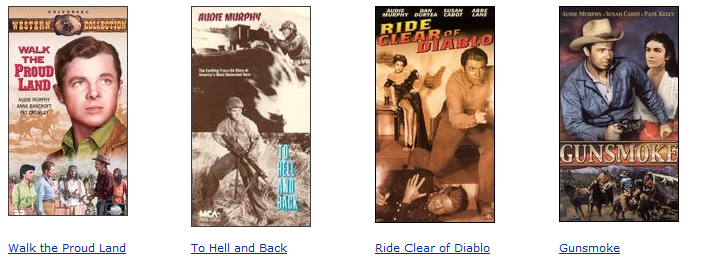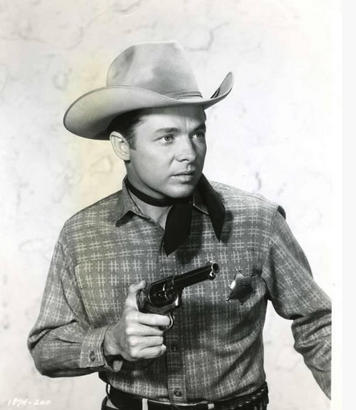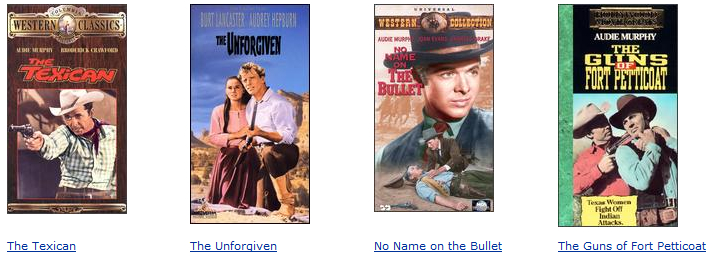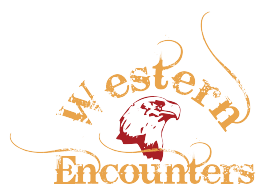|
Advertisments |
||
|
||
|
||
|
Audie Murphy
|
||
|
|
||
|
Sam Elliott
James Stewart
Robert Duvall
Ben Johnson
Walter Brennen
Randolph Scott
Clint Eastwood
Tommy Lee Jones
John Wayne
Joel McCrea
Tom Selleck
Audie Murphy
Robert Taylor
Gene Hackman
Andy Devine
Burt Lancaster
Gary Cooper
Alan Ladd
Kevin Costner
Kirk Douglas
Lee Marvin
Paul Newman
Audie Murphy
Over the course of his extraordinary life, Audie Murphy went from being a poor Texas sharecropper's son to America's most decorated WWII hero to a popular Western and action movie star. Though he died in 1971, his accomplishments are still commemorated in a variety of ways that range from his native Hunt County's annual Audie Murphy Day celebration to his induction into the National Cowboy Hall of Fame and the Country Music Association of Texas. His name also appears on a VA hospital, a library room, a stretch of U.S. Highway 69 in Texas, and a San Antonio division of the Army.
 |
Murphy was born to a family of cotton growers near Kingston, TX. Boyish-looking and slender, he appeared an unlikely war hero, but while stationed in Europe with his infantry unit, Murphy was credited with killing 240 Germans, was promoted to lieutenant, and earned at least 24 medals, including a Purple Heart for a gunshot wound that shattered his hip and the coveted Congressional Medal of Honor.
Following the war, Murphy worked as a clerk and a garage attendant before James Cagney invited him to his Hollywood home. Murphy stayed for 18 months and made his screen debut in Beyond Glory (1948), playing a guilt-ridden soldier. He had his first starring role in Bad Boy (1949) and was praised for his naturalistic acting style. Some critics chided him for only playing himself, but Murphy never claimed any acting ability. For audiences impressed with his war record and charmed by his charisma, Murphy playing himself was enough to sustain his busy film career for two decades. By the early '50s, Murphy was appearing in second-string Westerns. In 1953, distinguished director John Huston, whom Murphy regarded as a friend and mentor, starred him as the young soldier in his adaptation of Stephen Crane's The Red Badge of Courage (1953). He would again work with Huston in 1960s' The Unforgiven. In 1955, Murphy appeared in his signature film, To Hell and Back, a chronicle of his war experiences based on his published autobiography. This film's box-office success allowed Murphy to appear in larger-budget films through the early '60s when he once again returned to B-movies. All told, during his heyday, Murphy worked with some of the era's most prominent stars including Jimmy Stewart, Broderick Crawford, and Audrey Hepburn.
But while Murphy's professional life flourished, he had to grapple with some tough situations in his personal life. In the late '60s, an Algerian oil field he'd purchased was blown up during the Seven Day War. Murphy lost around 250,000 dollars. In 1970, he was tried and acquitted for beating up and threatening to kill a man during a heated fight, the precise circumstances of which remain muddled. Despite this courtroom victory, rumors circulated that Murphy was suffering personal problems resulting from his war experiences.
Murphy was once briefly married to actress Wanda Hendrix with whom he had appeared in Sierra (1950). In 1951, Murphy married Pamela Archer and they remained happily wed until he accidentally crashed his plane into a Virginia mountainside on Memorial Day 1971. Murphy was given a full military burial and was interred in Arlington Cemetery.
After seeing the young hero's photo on the cover of the July 16 edition of Life Magazine and sensing star potential, actor James Cagney invited Murphy to Hollywood in September 1945. Despite Cagney's expectations, the next few years in California were difficult for Murphy. He became disillusioned by the lack of work, was frequently broke, and slept on the floor of a gymnasium owned by his friend Terry Hunt. He eventually received token acting parts in the 1948 films Beyond Glory and Texas, Brooklyn and Heaven. His third movie, Bad Boy, gave him his first leading role.
He also starred in the 1951 adaptation of Stephen Crane's Civil War novel, The Red Badge of Courage, which earned critical success. Murphy expressed great discomfort in playing himself in To Hell and Back. In 1959, he starred in the western No Name on the Bullet, in which his performance was well-received despite being cast as the villain, a professional killer who managed to stay within the law.
First starring role
After returning home from World War II, Murphy bought a house in Farmersville, Texas for his oldest sister Corrine, her husband Poland Burns, and their three children. His three youngest siblings, Nadine, Billie, and Joe, had been living in an orphanage since Murphy's mother's death, He intended that they would be able to live with Corrine and Poland. However, six children under one roof proved difficult for Corrine and Poland to parent, and Murphy took his siblings to live with him.

Despite a lot of post-war publicity, his acting career had not progressed and he had difficulty making a living. Buck, Murphy's oldest brother, and his wife agreed to take Nadine in, but Murphy could not find a home for Joe. He approached James "Skipper" Cherry, a Dallas theater owner who was involved with the Variety Clubs International Boy's Ranch, a 4,800 acres (19 km2) ranch near Copperas Cove, Texas. He arranged for Joe to live at the Boy's Ranch. Joe was very happy there and Murphy was able to frequently visit his brother as well as his friend Cherry. In a 1973 interview, Cherry recalled, "He was discouraged and somewhat despondent concerning his movie career.
Variety Clubs International was financing a film Bad Boy to help promote the organization's work with troubled children. Cherry called Texas theater executive Paul Short, who was producing the film, to suggest that they consider giving Murphy a significant role in the movie. Murphy performed well in the screen test, but the president of Allied Artists did not want to cast someone in a major role with so little acting experience. Cherry, Short, and other Texas theater owners decided that they wanted Murphy to play the lead or would not finance the film. The producers agreed and Murphy's performance was well-received by Hollywood. As a result of the film, Universal Studios signed Murphy to a seven-year studio contract. After a few box-office hits at Universal, the studio bosses gave Murphy increased scope in choosing his roles.[citation needed]
Autobiography To Hell and Back
Murphy's 1949 autobiography To Hell and Back became a national bestseller. The book was ghostwritten by his friend David "Spec" McClure, already a professional writer. Murphy modestly described some of his most heroic actions—without portraying himself as a hero. He did not mention any of the many decorations he received, but praised the skills, bravery, and dedication of the other members of his platoon. Murphy even attributed a song he had written to "Kerrigan"
Murphy portrayed himself in the 1955 film version of his book with the same title, To Hell and Back. Murphy was initially reluctant to star in To Hell and Back, fearing it would appear he was cashing in on his war experience. He suggested Tony Curtis for the role. In To Hell and Back, unlike most Hollywood films, where the same soldiers serve throughout the movie, Murphy's comrades are killed or wounded as they were in real life. At the film's end, Murphy is the only member of his original unit remaining. At the ceremony where Murphy is awarded the Medal of Honor, the ghostly images of his dead friends are depicted. This insistence on reality has been attributed to Murphy and his desire to honor his fallen friends.[citation needed]
The film grossed almost US$10 million during its initial theatrical release, and at the time became Universal Studios's biggest hit of the studio's 43-year history. The movie held the record as the company's highest-grossing motion picture until 1975, when it was surpassed by Steven Spielberg's Jaws.
Audie Murphy's oldest son, Terry, portrayed Audie's younger brother Joseph Preston "Joe" Murphy (at age four).[19]
The film was introduced by General Walter Bedell Smith, United States Army, Retired. During World War II, Smith had served as Chief of Staff to General Dwight D. Eisenhower. Harold B. Simpson's 1975 comprehensive biography, Audie Murphy, American Soldier, covers the breadth of Murphy's life. The book emphasizes his military exploits, and includes photos, maps, and battle-maneuver diagrams. Murphy's post-war career is also well-documented.[citation needed]
Filmography
Films made
In the 25 years he spent in Hollywood, Murphy made 44 feature films, 33 of them Westerns. His highest grossing film was the autobiographical To Hell and Back, which was the highest grossing film for Universal Pictures, until Jaws in 1975.[unreliable source?] His films earned him close to $3 million in his 23 years as an actor.[unreliable source?] He also appeared in several television shows, including the lead in the short-lived 1961 NBC western detective series Whispering Smith, set in Denver, Colorado. For his contribution to the motion picture industry, Murphy has a star on the Hollywood Walk of Fame at 1601 Vine Street.
Music career
In addition to acting, Murphy also became successful as a country music songwriter. He teamed up with musicians and composers including Guy Mitchell, Jimmy Bryant, Scott Turner, Coy Ziegler, Ray and Terri Eddlemon. Murphy's songs were recorded and released by well-known artists including Dean Martin, Eddy Arnold, Charley Pride, Jimmy Bryant, Porter Waggoner, Jerry Wallace, Roy Clark, and Harry Nilsson. His two biggest hits were "Shutters and Boards" and "When the Wind Blows in Chicago".[citation needed]
Personal life
Post-war illness
Murphy was reportedly plagued by insomnia, bouts of depression, and nightmares related to his numerous battles throughout his life. His first wife, Wanda Hendrix, often talked of his struggle with this condition, even claiming that he had held her at gunpoint once. For a time during the mid-1960s, he became dependent on doctor-prescribed sleeping pills called Placidyl. When he recognized that he had become addicted to the drug, he locked himself in a motel room where he took himself off the pills, going through withdrawal for a week.[citation needed]
 |
Always an advocate of the needs of America's military veterans, Murphy eventually broke the taboo about publicly discussing war-related mental conditions. In an effort to draw attention to the problems of returning Korean and Vietnam War veterans, Murphy spoke out candidly about his own problems with PTSD, known then and during World War II as "battle fatigue". He called on the United States government to give increased consideration and study to the emotional impact that combat experiences have on veterans, and to extend health care benefits to address PTSD and other mental-health problems suffered by returning war veterans.
Murphy married actress Wanda Hendrix in 1949; they were divorced in 1951. He then married former airline stewardess Pamela Archer, by whom he had two children: Terrance Michael "Terry" Murphy (born 1952) and James Shannon "Skipper" Murphy (born 1954). They were named for two of his most respected friends, Terry Hunt and James "Skipper" Cherry, respectively. Murphy became a successful actor, rancher, and businessman, breeding and raising Quarter Horses. He owned ranches in Texas, Tucson, Arizona and Menifee, California.
Death
Murphy's headstone
Around 11:08am on May 28, 1971, Murphy was killed when the private plane in which he was a passenger crashed into Brush Mountain, near Catawba, Virginia, 20 miles west of Roanoke, Virginia in conditions of rain, clouds/fog and zero visibility. The pilot and four other passengers were also killed. The aircraft was a twin engine Aero Commander 680 with registration number N601JJ, flown by a pilot who had private-pilot license and a reported 8,000 hours of flying time, but who held no instrument rating. The aircraft was recovered on May 31, 1971.
In 1974, a large granite marker was erected at 37.364554N 80.225748W lat/long at 3,100' elevation, near the crash site. A close friend, Captain Carl Swickerath (whose own burial site is now directly in front of Murphy's), represented the Murphy family at the dedication.
Monument at the site of the plane crash in which Audie Murphy died
On June 7, 1971, Murphy was buried with full military honors at Arlington National Cemetery. The official U.S. representative at the ceremony was decorated World War II veteran and future President George H. W. Bush. Murphy's grave site is in Section 46, headstone number 46-366-11, located across Memorial Drive from the Amphitheater. A special flagstone walkway was later constructed to accommodate the large number of people who visit to pay their respects. It is the second most-visited grave site, after that of President John F. Kennedy.
The headstones of Medal of Honor recipients buried at Arlington National Cemetery are normally decorated in gold leaf. Murphy previously requested that his stone remain plain and inconspicuous, like that of an ordinary soldier. An unknown person maintains a small American flag next to his engraved Government-issue headstone, which reads as follows:
Audie L. Murphy, Texas. Major, Infantry, World War II. June 20, 1924 to May 28, 1971. Medal of Honor, DSC, SS & OLC, LM, BSM & OLC, PH & 2 OLC.
(Key to abbreviations: DSC = Distinguished Service Cross; SS = Silver Star; LM = Legion of Merit; BSM = Bronze Star Medal; PH = Purple Heart; OLC = Oak Leaf Cluster.)
An Oak Leaf Cluster signifies a subsequent award of the same decoration. First Lieutenant Murphy was one of very few company-grade officers ever to be awarded the Legion of Merit. That decoration is usually awarded only to officers of the rank of lieutenant colonel and above. At his funeral, a friend noted "Like the man, the headstone is too small".[citation needed]
Questions arose about the nature of the plane crash that claimed Murphy's life. In April 1971, Murphy had sought the release of his friend, Teamster Union president Jimmy Hoffa, from federal prison on conviction in 1964 of jury tampering. (Murphy had tried to persuade Edward Grady Partin of Baton Rouge, the Teamsters business agent who had provided immunized testimony against Hoffa, to recant his earlier claims.) Following Murphy's death, Arthur Egan, who had worked with Murphy in the bid to get Hoffa freed, said he suspected that the fatal plane crash was not an accident. However, Hoffa was freed seven months after Murphy's death and no forensic evidence has arisen to suggest the plane crash was in any way connected to the Hoffa case or not the result of an accident.[

Home <> Western Gallery <> Western Dictionary <> Cowboys <> Reining
Western Store <>Western Writers <> Western Stars <> Western TV <> Country Music <> Guns <> Western Vacations

